New research by Hassell with Density shows North American tech offices are lagging in adapting to hybrid work, resulting in underutilised spaces.

Computershare-EarlCarter-0181_award
September 2nd, 2024
Recent research conducted by Hassell and workplace analytics leader Density reveals that tech companies in North America are struggling to adapt their workplace designs to new hybrid work patterns. Despite being at the forefront of workplace innovation, these companies are now faced with significant inefficiencies in how they use their office spaces, resulting in wasted resources and underutilised environments.
The study, titled ‘The State of Tech Industry Workplaces,’ examined over 130,000 square metres of workspace across the tech sector from May 2023 to May 2024. The research aimed to understand the relationships between office utilisation, return-to-work (RTO) policies, and workspace layouts in the evolving hybrid work environment.

One of the key findings of the report is that the impact of RTO policies on office utilisation is less significant than expected. Moving from a flexible RTO policy, where employees choose when to come into the office, to a mandatory three-day in-office policy only increased peak daily utilisation by 17 per cent, from 29 to 46 per cent. This suggests that hybrid work policies are not being fully enforced or respected, leading to continued low utilisation rates.
Another major insight from the study is that employees who have the flexibility to decide where they work tend to spend more time in meeting rooms when they are in the office. Specifically, 48 per cent of their in-office time is spent in meeting rooms, compared to 29 per cent for those with a mandatory three-day in-office policy and 23 per cent for those with a two-day policy. This indicates that when employees choose to come into the office, it is primarily for collaborative purposes, highlighting the need for workspaces that facilitate interaction and teamwork.

However, the report also found that tech companies have over-optimised for open-plan offices. Every workplace studied was open-plan, with very few enclosed offices. This design, while conducive to collaboration, does not align well with the needs of employees who engage in video calls and hybrid meetings, which are increasingly common in the current work environment. As a result, meeting rooms are being repurposed as private offices or quiet spaces, with 36 per cent of meeting room usage being for individual work rather than group collaboration.
Dr. Daniel Davis, Head of Research at Hassell and co-author of the report, comments on the findings: “Tech companies have traditionally been workplace leaders. Their amenity-rich offices nurtured billion-dollar businesses and untold envy. Then the pandemic happened. Many quickly adopted hybrid and remote work. Now, some of those offices sit underutilised while others struggle to accommodate new work patterns.”
Related: The cutting edge workplace at Darling Quarter

The report emphasises the financial and environmental implications of these underutilised spaces. With average annual rents for San Francisco-based tech companies exceeding US$8000 per employee, the study estimates that up to US$40 million in rent costs are wasted annually on underused office space. Moreover, buildings account for 39 per cent of global CO2 emissions, making it imperative for tech companies to rethink their workspace designs to reduce both costs and environmental impact.
The research provides actionable insights for businesses looking to optimise their workplace utilisation and design. By embracing innovative designs that cater to hybrid work models, tech companies can maximise space utilisation, foster collaboration and create more adaptable work environments.
Hassell
hassellstudio.com




INDESIGN is on instagram
Follow @indesignlive
A searchable and comprehensive guide for specifying leading products and their suppliers
Keep up to date with the latest and greatest from our industry BFF's!

Now cooking and entertaining from his minimalist home kitchen designed around Gaggenau’s refined performance, Chef Wu brings professional craft into a calm and well-composed setting.

For a closer look behind the creative process, watch this video interview with Sebastian Nash, where he explores the making of King Living’s textile range – from fibre choices to design intent.

In a tightly held heritage pocket of Woollahra, a reworked Neo-Georgian house reveals the power of restraint. Designed by Tobias Partners, this compact home demonstrates how a reduced material palette, thoughtful appliance selection and enduring craftsmanship can create a space designed for generations to come.
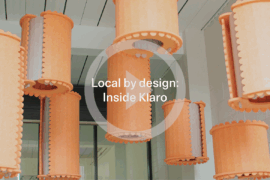
In an industry where design intent is often diluted by value management and procurement pressures, Klaro Industrial Design positions manufacturing as a creative ally – allowing commercial interior designers to deliver unique pieces aligned to the project’s original vision.
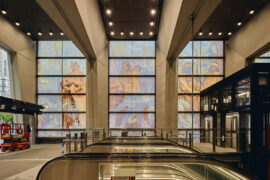
Ingrid Bakker, Principal and Joint Project Director at Hassell, discusses the wider importance of the “city-shaping” Metro Tunnel completed alongside WW+P Architects and RSHP.
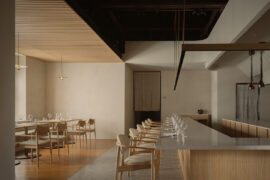
The Japanese firm brings elements of calm into Loca Niru, a fine-dining restaurant housed in a 146-year-old mansion in Singapore.
The internet never sleeps! Here's the stuff you might have missed
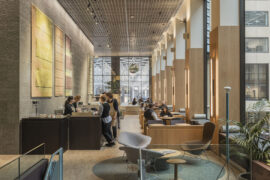
The Commons opens new Sydney and Melbourne locations by DesignOffice, blending hospitality, design and community.
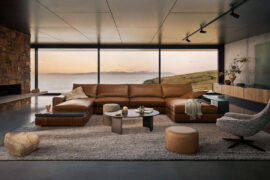
With steel frames and modular components, King Living sofas are designed to endure – as seen in the evolving modularity of the Jasper Sofa and the reimagined 1977 Sofa collection.